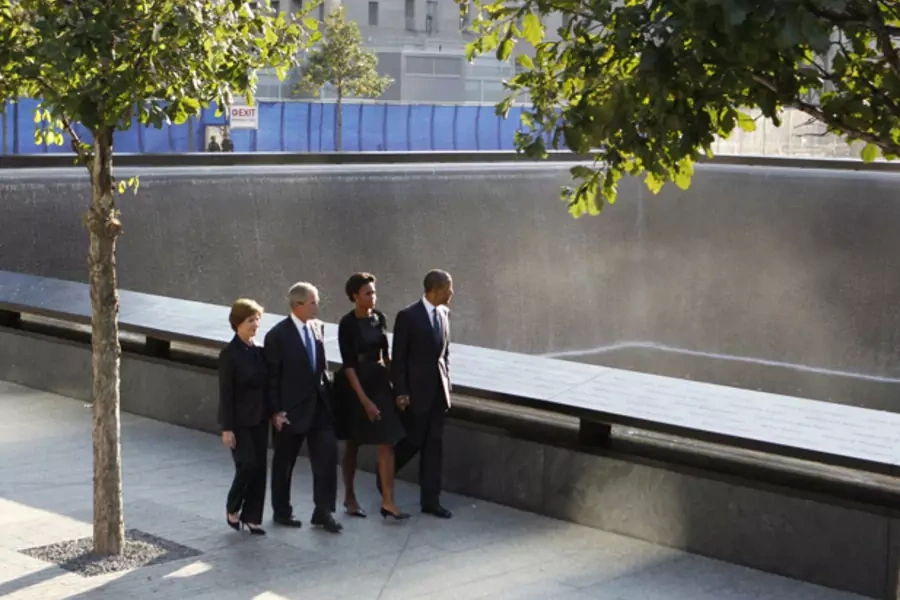The World Next Week: September 11, the November Election, and Ben Bernanke

More on:
The World Next Week podcast is up. Bob McMahon and I discussed the anniversary of the September 11 terrorist attacks; the home stretch of the presidential campaign; and what Federal Reserve Chairman Ben Bernanke will decide at next week’s meeting of the Fed’s policymaking committee.
[audio: http://www.cfr.org/content/publications/media/editorial/2012/20120906_T…]
The highlights:
- Eleven years after the 9/11 attacks the United States has made significant strides in diminishing the odds of a catastrophic terrorist attack. That is partly because al-Qaeda no longer has the advantage of surprise, and partly because intelligence, law enforcement, and military operations have killed or captured much of al-Qaeda’s leadership and disrupted its operations. Only 34 percent of Americans say that terrorism is an "extremely important" factor in their decision on who should be president, down from 42 percent four years ago. Perhaps more telling about how much terrorism has receded from American public life, less than one percent of Americans flag it as the most important problem currently facing the country. Nonetheless, the essential danger of terrorism remains: while government has to foil every plot to be successful, terrorists need to succeed just once.
- In honor of the 9/11 anniversary, Barack Obama and Mitt Romney have agreed to suspend political ads for the day. But otherwise, you can expect both sides to go full bore with just two months left until the election. Foreign policy is unlikely to be a leading issue, as Romney’s decision to devote less than two hundred words in his four-thousand word acceptance speech to the challenges America faces overseas attests. Specific foreign policy issues could dominate the campaign conversation if one of the candidates says something unwise, as the Democrats look to have done with the platform flap over Jerusalem, or if events overseas take a turn for the worse.
- Federal Reserve chairman Ben Bernanke gave a speech late last month that has raised expectations that the Fed will take steps soon to jumpstart the sputtering U.S. economy. Such a move would be controversial, as it could be read as trying to influence the outcome of the election. Of course, not doing anything could be read the same way. We will know what Bernanke’s choice is after the Fed’s policymaking committee meeting next week. Even if he decides in favor of steps to stimulate economic activity, the U.S. economy still faces a potentially powerful contractionary force: the looming “fiscal cliff.” Some U.S. companies are already considering layoffs because of the confluence of sequestration, the end of the Bush tax cuts, and several other government policy changes set to go into effect in January.
- Bob’s Figure of the Week is Mario Draghi. My Figure of the Week is 23,000. As always, you’ll have to listen to the podcast to find out why.
For more on the topics we discussed in the podcast check out:
Anniversary of September 11 Terrorist Attacks. The Daily News reports that the Romney and Obama campaigns have agreed not to run political ads on September 11. Secretary of Defense Leon E. Panetta is scheduled to visit the Flight 93 National Memorial on Monday, September 10; the Flight 93 National Memorial has organized events throughout the week to commemorate the victims of the attack. Bloomberg writes that Stephen Colbert spoke at a 9/11 Memorial benefit dinner on Tuesday. Last year, President Obama declared September 11 to be Patriot Day, a national holiday committed to the memory of the victims of 9/11.
The Presidential Campaign Enters the Home Stretch. The Economist writes that after a rough first-term, President Obama will need to convince voters that he can bring change in a second term. The Wall Street Journal notes that voters give President Obama higher marks than Mitt Romney on national security, something seldom seen with Democratic presidential candidates. Foreign Policy flags the reasons that President Obama has the upper-hand in this election.
Fed Policymaking Committee Convenes. The New York Times speculates about what Fed Chairman Ben Bernanke will do next. CNN suggests that the Fed may still change monetary policy, despite the tense campaign climate. The Wall Street Journal concludes that the Fed is still lukewarm over lowering the reserve rate. The Washington Post contends that Columbia University professor Michael Woodford may have authored the most important monetary policy paper this year; find it here. The Federal Reserve shares the minutes of the Federal Open Market Committee meeting.
More on:
 Online Store
Online Store